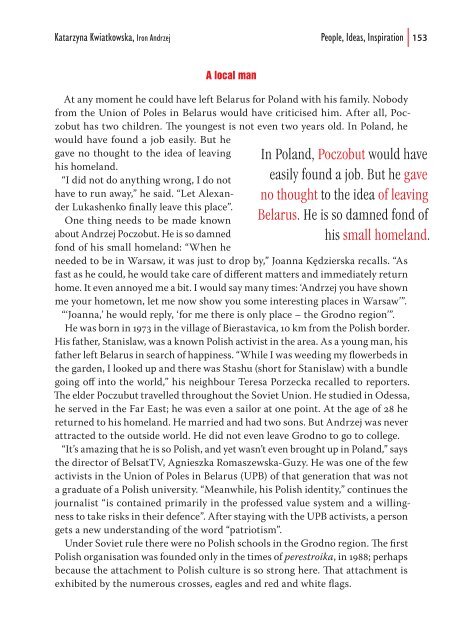Create successful ePaper yourself
Turn your PDF publications into a flip-book with our unique Google optimized e-Paper software.
Katarzyna Kwiatkowska, Iron Andrzej People, Ideas, Inspiration<br />
A local man<br />
At any moment he could have left Belarus for Poland with his family. Nobody<br />
from the Union of Poles in Belarus would have criticised him. After all, Poczobut<br />
has two children. Th e youngest is not even two years old. In Poland, he<br />
would have found a job easily. But he<br />
gave no thought to the idea of leaving<br />
his homeland.<br />
“I did not do anything wrong, I do not<br />
have to run away,” he said. “Let Alexander<br />
Lukashenko fi nally leave this place”.<br />
One thing needs to be made known<br />
about Andrzej Poczobut. He is so damned<br />
fond of his small homeland: “When he<br />
needed to be in Warsaw, it was just to drop by,” Joanna Kędzierska recalls. “As<br />
fast as he could, he would take care of diff erent matters and immediately return<br />
home. It even annoyed me a bit. I would say many times: ‘Andrzej you have shown<br />
me your hometown, let me now show you some interesting places in Warsaw’”.<br />
“‘Joanna,’ he would reply, ‘for me there is only place – the Grodno region’”.<br />
He was born in 1973 in the village of Bierastavica, 10 km from the Polish border.<br />
His father, Stanislaw, was a known Polish activist in the area. As a young man, his<br />
father left Belarus in search of happiness. “While I was weeding my fl owerbeds in<br />
the garden, I looked up and there was Stashu (short for Stanislaw) with a bundle<br />
going off into the world,” his neighbour Teresa Porzecka recalled to reporters.<br />
Th e elder Poczubut travelled throughout the Soviet Union. He studied in Odessa,<br />
he served in the Far East; he was even a sailor at one point. At the age of 28 he<br />
returned to his homeland. He married and had two sons. But Andrzej was never<br />
attracted to the outside world. He did not even leave Grodno to go to college.<br />
“It’s amazing that he is so Polish, and yet wasn’t even brought up in Poland,” says<br />
the director of BelsatTV, Agnieszka Romaszewska-Guzy. He was one of the few<br />
activists in the Union of Poles in Belarus (UPB) of that generation that was not<br />
a graduate of a Polish university. “Meanwhile, his Polish identity,” continues the<br />
journalist “is contained primarily in the professed value system and a willingness<br />
to take risks in their defence”. After staying with the UPB activists, a person<br />
gets a new understanding of the word “patriotism”.<br />
Under Soviet rule there were no Polish schools in the Grodno region. Th e fi rst<br />
Polish organisation was founded only in the times of perestroika, in 1988; perhaps<br />
because the attachment to Polish culture is so strong here. Th at attachment is<br />
exhibited by the numerous crosses, eagles and red and white fl ags.<br />
153<br />
In Poland, Poczobut would have<br />
easily found a job. But he gave<br />
no thought to the idea of leaving<br />
Belarus. He is so damned fond of<br />
his small homeland.



